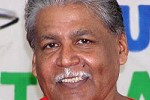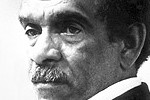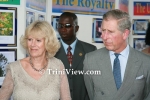By Raffique Shah
Sunday, April 20th 2008
 THIRTY-EIGHT years ago tomorrow, a group of us comprising young officers in the Trinidad and Tobago Regiment (TTR), along with a few hundred soldiers, etched our names in history by revolting and seizing control of the army’s HQ at Teteron Barracks. We would hold the camp for ten days before subjecting ourselves to being arrested. We were charged with mutiny and treason among other serious offences. Of the 80-odd men arrested, around 40 faced court martial, with 25-or-so being sentenced to various terms of imprisonment. After 27 months in jail, we would walk free, thanks to the judicial system that remained fiercely independent of the political directorate.
THIRTY-EIGHT years ago tomorrow, a group of us comprising young officers in the Trinidad and Tobago Regiment (TTR), along with a few hundred soldiers, etched our names in history by revolting and seizing control of the army’s HQ at Teteron Barracks. We would hold the camp for ten days before subjecting ourselves to being arrested. We were charged with mutiny and treason among other serious offences. Of the 80-odd men arrested, around 40 faced court martial, with 25-or-so being sentenced to various terms of imprisonment. After 27 months in jail, we would walk free, thanks to the judicial system that remained fiercely independent of the political directorate.
Continue reading Nostalgia for the 1970s

 This critique is in response to an article titled “Judge: Address racism to move ahead” that appeared in The Daily Express (14 April 2008) in which Justice Wendell Kangaloo is reported to have said that “we in Trinidad and Tobago would do well to start a conversation about race” in order to move this country forward.
This critique is in response to an article titled “Judge: Address racism to move ahead” that appeared in The Daily Express (14 April 2008) in which Justice Wendell Kangaloo is reported to have said that “we in Trinidad and Tobago would do well to start a conversation about race” in order to move this country forward. In Omeros, Derek Walcott’s epic poem, Achille, one of the major protagonists, returns to Africa and is welcomed home by Ofolabe, his father. During that visit, Ofolabe learns that Achille changed his African name to a Caribbean name that has little meaning. Hurt by this name change, Afolabe retorts:
In Omeros, Derek Walcott’s epic poem, Achille, one of the major protagonists, returns to Africa and is welcomed home by Ofolabe, his father. During that visit, Ofolabe learns that Achille changed his African name to a Caribbean name that has little meaning. Hurt by this name change, Afolabe retorts: Over the past two weeks, some of my friends have accused me of or complimented me for going down memory lane. Others have suggested that once the genie is out of the bottle there is really no way to get it back in. They are both correct but for the wrong reasons. There was no attempt to go down memory lane for its own sake or to get the genie back into the bottle. I was trying to say that when experts talk about our crime situation and/or the factors leading towards its escalation they usually forget the human or ideological dimension of the problem even as they emphasize the hard, economic, policing or political dimensions.
Over the past two weeks, some of my friends have accused me of or complimented me for going down memory lane. Others have suggested that once the genie is out of the bottle there is really no way to get it back in. They are both correct but for the wrong reasons. There was no attempt to go down memory lane for its own sake or to get the genie back into the bottle. I was trying to say that when experts talk about our crime situation and/or the factors leading towards its escalation they usually forget the human or ideological dimension of the problem even as they emphasize the hard, economic, policing or political dimensions. ON March 26, Tata Motors, a division of India’s oldest and most diversified conglomerate, paid the mighty Ford of America US$2.3 billion to acquire two jewels in Britain’s motoring crown, Land Rover and Jaguar. The next day Tata Chemicals acquired General Chemicals of the USA for US$1 billion. Even as the Tata Group spread its wings across the globe, a handful of Trinidad and Tobago’s biggest businessmen and institutions gathered at the Trinidad Hilton to sell their shares in RBTT to the Royal Bank of Canada (RBC).
ON March 26, Tata Motors, a division of India’s oldest and most diversified conglomerate, paid the mighty Ford of America US$2.3 billion to acquire two jewels in Britain’s motoring crown, Land Rover and Jaguar. The next day Tata Chemicals acquired General Chemicals of the USA for US$1 billion. Even as the Tata Group spread its wings across the globe, a handful of Trinidad and Tobago’s biggest businessmen and institutions gathered at the Trinidad Hilton to sell their shares in RBTT to the Royal Bank of Canada (RBC). The Prince of Wales, Charles Philip Arthur George and his wife Camilla, the Duchess of Cornwall, paid a visit to the University of the West Indies, St. Augustine campus, on Wednesday 5th March, 2008, as part of their tour of Trinidad and Tobago to promote environmentalism and to reinforce British ties with former colonies. The couple made their way to the JFK Quadrangle to view the UWI 60th Anniversary Exhibition, to look at and to play the G Pan and to observe a skit put on by the Centre for Creative and Festival Arts.
The Prince of Wales, Charles Philip Arthur George and his wife Camilla, the Duchess of Cornwall, paid a visit to the University of the West Indies, St. Augustine campus, on Wednesday 5th March, 2008, as part of their tour of Trinidad and Tobago to promote environmentalism and to reinforce British ties with former colonies. The couple made their way to the JFK Quadrangle to view the UWI 60th Anniversary Exhibition, to look at and to play the G Pan and to observe a skit put on by the Centre for Creative and Festival Arts.
 LISTENING to today’s masquerade band leaders clamour for the Government to “run more money” my thoughts fall back on yesterday’s greats-George Bailey, Harold Saldenah, Cito Velasquez, Irwin McWilliams, the Harts and the Lee Heungs, to name a handful. These creative geniuses, forerunners to Wayne Berkeley and Peter Minshall, presented generations of Trinidadians and Tobagonians with Carnival spectacles that remain forever etched in the minds of those who were fortunate to see them parade in the city.
LISTENING to today’s masquerade band leaders clamour for the Government to “run more money” my thoughts fall back on yesterday’s greats-George Bailey, Harold Saldenah, Cito Velasquez, Irwin McWilliams, the Harts and the Lee Heungs, to name a handful. These creative geniuses, forerunners to Wayne Berkeley and Peter Minshall, presented generations of Trinidadians and Tobagonians with Carnival spectacles that remain forever etched in the minds of those who were fortunate to see them parade in the city.